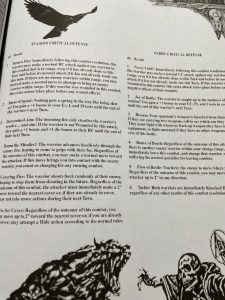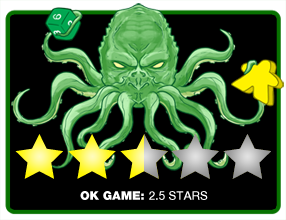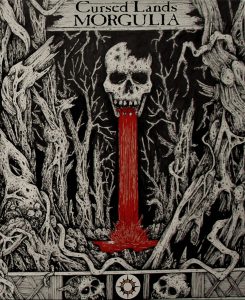 Are you looking to change up your miniatures games? Do you miss the dense rules of the early 90’s skirmish and war games? Do you want a dark, gritty, horror fantasy setting that is miniatures agnostic? Cursed Lands Morgulia scratches all these itches (sores?).
Are you looking to change up your miniatures games? Do you miss the dense rules of the early 90’s skirmish and war games? Do you want a dark, gritty, horror fantasy setting that is miniatures agnostic? Cursed Lands Morgulia scratches all these itches (sores?).
Cursed Lands Morgulia is a miniature agnostic game that is set in the horror-ravaged land of Morgulia. You and your friends choose a specific faction to play and then battle across a fleshed-out campaign or in a skirmish dictated by random tables and force objectives.
Each player starts with 250 resources which you use to build your warband. You can usually choose between a variety of champions retinues and equipment. The more expensive the piece the more effective it can be.
Whether you decide to do a one-time skirmish or play each game as a campaign through the lands of Morgulia, there is combat involved.

Once you and your opponent have your forces selected, it is time to go to battle.
Each battle round is broken into several phases: Recover, Rally, Move, Shoot, Close Combat, and Special Action. During the Recover phase, models that may have been knocked or fallen down stand back up. During Rally, fleeing models have a chance to rally and return to the fray. Moving is, of course, where characters move, run, and charge. Shooting is where models will utilize ranged weaponry. Close combat occurs when models can use melee weapons to try and injure opponent’s models. The special move phase is when certain special effects can trigger.
In Morgulia you are trying to roll lowest numbers for your checks. Checks occur throughout combat, from falling off terrain to being struck with a magic spell, checks are the main game mechanic that is taken throughout. Each check is made by using the corresponding dice pool (number of dice you roll) and trying to roll under the target number on a die. The higher your stat the easier it is to pass these tests. Rolling double (or more) 1s results in critical successes.
Each player will roll each turn to see who gets to activate their warband first and will alternate activations. During your turn, you try to achieve your objectives based on the scenarios and force you are playing. During the match players refer to multiple tables such as the rally and critical success tables to find out what the result of actions are.
Play continues until one of three conditions are met: a warband breaks, a warband’s warriors are injured or all fleeing, or D3 rounds after the 5th round.

Game Experience:
I liked the initial setting and idea of Morgulia. Using my favorite minis to play a universal rules game that has a dark horror twist. Unfortunately, most of our time spent while playing the game was wrapped up in looking for tables to roll on. I love that the variety of these unique interactions are included in the game, but it did slow down gameplay a lot during our plays. There is a different table for each weapon type of effect on a critical hit. I think these could be streamlined a little more to make the game more approachable for entry-level players. This is a double-edged sword, great variety at a cost of time. My opponent and I ended up calling it quits after a few hours into our first play since the game was dragging.

The gameplay system with the character/unit stats was solid, allowing for scaling based on character cost. Once we used different color dice for our dice pools it helped speed things up quite a bit. I would like to say that the unit stat blocks are a bit hard to read and we ended up restructuring things. This ties a little into the resource system to build forces. Morgulia’s resource buying for units and upgrades feels like old school wargame.
One area where other games could take a page from is the intricate terrain rules. Morgulia has a variety of terrain rules that greatly affect the play area. From providing static rules to being overly dangerous the terrain begs to be interacted with within Morgulia. We had fun holding different mausoleums that had different bonuses such as rolling extra die to cast checks or trying to strike deals with dark spirits in the graves there.
There was a large variety of sub-factions within both the human and undead forces. There is also a third section with forces such as cultist, vampires, and outsiders. All with unique unit structure, equipment, champions, and special abilities.
I feel that Morgulia would shine with its campaign play. The ability to steal enemy units, effect your opponents’ recruitments between games, and expand your resources and armies over time felt like the most fleshed out part of the game, which lacked a more cohesive story. I am hoping this is intentional so that your gaming group can create a story of their own within the blank canvas backdrop.
Final Thoughts:
I feel like Morgulia was created to scratch a very nostalgic itch to play complicated skirmish games. The rulebook feels like it is from the 90s and the mechanics, while exhaustive, are very crunchy for a newcomer to feel comfortable with. I am a wargamer and felt that I was constantly moving through tables upon tables to find out what die rolls to make.
One thing my friends and I agreed on was the rules for the terrain absolutely rock. They seemed to fix what we felt has been lacking in some larger named minis games for quite some time. The entire system being in the book is great and allows for everyone to buy a copy and run a campaign with minis they may already own. The resource system feels like a video game RPG allocation system and allows for further customization of your forces.
I really wish I could find out more about the land of Morgulia outside the force lore as it seems to have the potential to be a great setting. Overall, if you need to inject some fresh life (or un-life) into your gaming group and yearn for crunchy, complicated war games of old, then this is for you.
Final Score 2.5 Stars – A rules dense, minis-agnostic game that captures the feel of old school wargaming.
 Hits:
Hits:
• A variety of tables that result in unique battles.
• Resource recruitment system adds variety and depth.
• You can use any minis with 1” base sizes.
• Extensive terrain rules.
Misses:
• Rules are crunchy (dense) for new players.
• Lack of background story minus force lore.
• Lack of encompassing reference sheet.
• A lot of tables to reference.
• Unit formats are not quick to read.
• Book production quality.
Source: Board Game Quest





